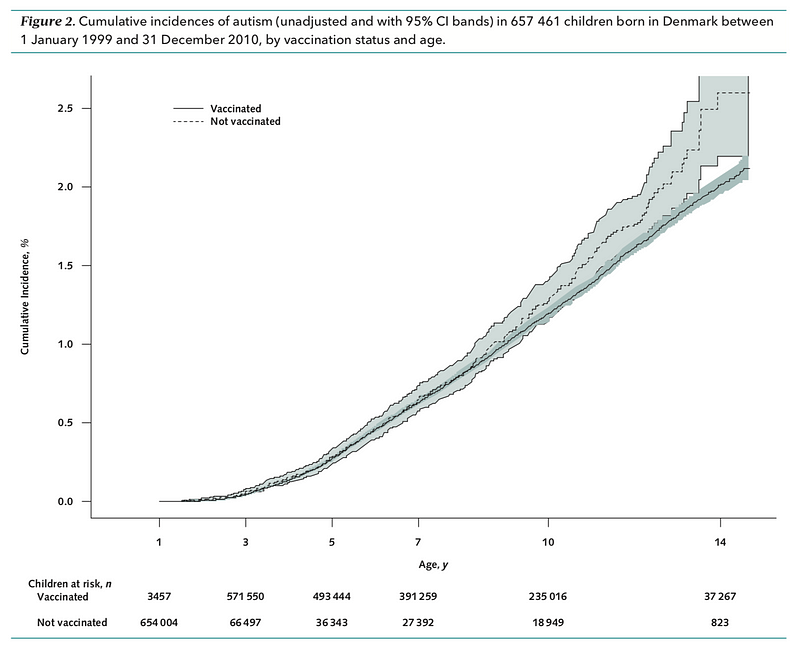The Scientific Consensus: No Link Between MMR Vaccine and Autism
Written on
Chapter 1: The Resurgence of Measles
Measles is making a comeback, with news outlets reporting a rise in cases of this highly contagious yet preventable disease. Those familiar with the outbreaks might recall the 2015 incident in California, which gained attention partly due to its association with Disneyland. Currently, states like Washington and New York are facing outbreaks, with seven additional states reporting cases, as per CDC data. The total count has exceeded 206 cases nationwide. It's important to note that the vaccine for measles boasts a 97% effectiveness rate after two doses, and remains 93% effective after just one dose. So, what accounts for the ongoing cases?
The primary reason is the lingering effects of a fraudulent study published in 1998 by Andrew Wakefield in the esteemed journal The Lancet. In this discredited paper, Wakefield claimed to have identified a dubious link between the measles, mumps, and rubella (MMR) vaccine and autism. Though the study was later proven to be entirely false, the repercussions have persisted, leading to a decline in vaccination rates across the US and Europe. Thankfully, the US healthcare system can provide support for those infected. In contrast, countries with inadequate healthcare infrastructure have suffered grave consequences; for instance, a recent measles outbreak in Madagascar resulted in over 900 fatalities. Historically, measles claimed around 6,000 lives annually in the US before the advent of vaccines, providing a strong incentive for parents to immunize their children.
Section 1.1: Fear and Misinformation
The decline in vaccination rates can be attributed to various factors, with one of the most significant being the unfounded fear of autism, often propagated through blogs and alternative medicine sites. Aside from the debunked Wakefield paper, no credible studies have established a connection between vaccination and autism. This week, another comprehensive study has been added to the growing body of research debunking this myth. It can be frustrating that scientists must repeatedly validate the absence of this association, yet it also highlights the reliability of the scientific method, offering a sense of comfort in the reproducibility of findings — a feature not always present in biomedical sciences.
The first video, "Controversial researcher claims link between vaccine and autism | 60 Minutes Australia," explores the origins and implications of the misinformation surrounding vaccines and autism.
Subsection 1.1.1: Insights from Recent Research
The latest study, published in the Annals of Internal Medicine, involved over 650,000 healthy children monitored for approximately thirteen years. By the end of the study, 6,517 children were diagnosed with autism. When comparing the incidence of autism between vaccinated and unvaccinated children, no correlation was found. In fact, the vaccinated group exhibited a slightly lower incidence of autism. This aligns with previous findings from the same research team and corroborates studies conducted in Poland, the UK, the US, and Japan, as noted in a substantial meta-analysis.

Section 1.2: Detailed Findings from Subgroup Analyses
The significance of this study lies in its large sample size and rigorous design, which allowed for subgroup analyses based on various risk factors and different autism phenotypes. One notable finding was that vaccinated girls showed a reduced risk of developing autism. Additionally, when a sibling of a child with autism was vaccinated, their risk for developing autism remained unchanged. This is particularly interesting, as one might assume that a child with an autistic sibling would have a higher genetic risk and that vaccination could act as a potential trigger. However, the current data contradicts this assumption. It's important to note that families with one child diagnosed with autism often choose not to vaccinate their other children, which presents a public health concern that may now be addressed.
Chapter 2: The Ongoing Debate
Despite the overwhelming data supporting the lack of association between vaccines and autism, continued research is beneficial. It underscores the power of the scientific method and the importance of rigorous inquiry and statistical analysis in uncovering truths about nature. Moreover, it reinforces the notion that vaccines are a highly safe public health measure. Regrettably, misinformation about vaccines remains prevalent, particularly in light of recent outbreaks. CNN recently reported that at least 20 states have introduced legislation expanding exemptions for childhood vaccinations. As a physician who values personal autonomy in medical choices, I recognize the importance of individual decisions. However, it is essential to consider the broader implications of opting out of vaccinations, which can adversely affect the health of others.
The second video, "Studies Confirm, Vaccines Still Don't Cause Autism. But Are These Studies Helping?" discusses the ongoing efforts to clarify vaccine safety and dispel myths surrounding autism.